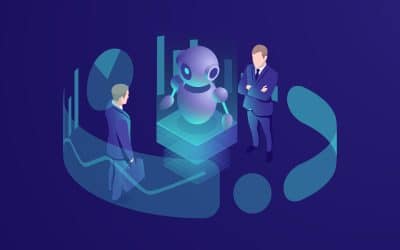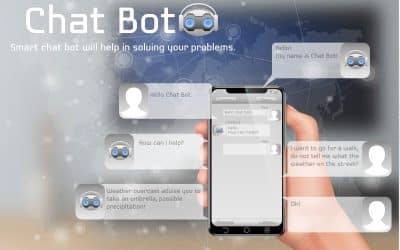In a time of rapid technological advancement, the expression “The Future is Now Dive into Artificial Intelligence Development” describes the ever-changing world of transformation and innovation. Artificial Intelligence (AI) stands at the forefront of this transformation, transforming industries and human interactions and advancing societies towards an unimaginable future.
This article is an introduction to the sweeping advancements defining the current situation of AI and highlights its diverse impact on different areas of life. From machine learning algorithms that power intelligent systems to ethical concerns regarding artificial intelligence development, the journey to the core of the development of artificial intelligence is a fascinating investigation.
When we traverse this terrain, we will discover key developments, new trends, and the interconnectedness between AI and different sectors. The introduction sets the stage for a deep study of the technologies shaping our lives and provides an overview of the infinite possibilities ahead as we dive into the realm in which Artificial Intelligence and future technologies merge.
Revolutionizing Industries with AI Solutions
The revolutionizing of industries through AI solutions is a revolutionary shift transforming traditional thinking that propels businesses into a new era of effectiveness and technological innovation. Integrating artificial intelligence across various industries, including healthcare, manufacturing, and more, fundamentally changes the operational landscape. In the manufacturing industry, AI-driven automation improves processes for production, enhancing accuracy and minimizing mistakes, increasing productivity.
Healthcare sees a dramatic increase because AI aids in diagnosis, drug discovery, and individualized treatments, which has ushered in an era of more efficient and targeted medical treatments. The financial industry benefits from AI’s prescriptive analytics that allow instant risk assessments and fraud detection. In addition, in the customer service field, natural language processing and chatbots can enhance customer experiences by offering instantaneous, personal interactions. Retailing is experiencing a revival thanks to AI-powered recommendation systems, predictive inventory management, and seamless user journeys.
Agriculture is embracing precision farming methods that use AI studying data to maximize yields and utilization of resources. The energy sector uses daily maintenance needs, increasing the efficiency and reliability of infrastructure that is critical to operation. The education landscape is being transformed through customized educational experiences and adaptive assessment smart tutoring and learning systems.
This paradigm shift goes far beyond mere efficiency improvements as it opens up a whole new realm of possibilities, boosting imagination and pushing the limits of what was previously thought impossible. When industries leverage the potential to harness the power of AI technology, they will not only have to navigate the waters of change but also rethink the essence of their existence in a time when artificial intelligence is the catalyst for unprecedented technological advancement.
AI’s Impact on Everyday Life
The impact of AI on our daily lives is an all-encompassing and transformative force woven into our lives with astonishing dimensions and breadth. From the time we get up to alarms set by smart virtual assistants, AI alters our daily routines to make them smoother and more personal. In communication, natural language processing facilitates using voice-activated commands, dictation, and chatbots, changing our interactions with technology.
Smart home appliances powered by AI optimize energy use, anticipate our needs, and increase security. Social media platforms utilize AI algorithms to recommend content, targeted ads, and sentiment analysis to tailor our online experience. In healthcare, AI aids in diagnostics, treatment planning, and finding drugs, allowing more precise and customized medical treatments. AI-driven navigation systems simplify travel by anticipating traffic patterns and suggesting the best routes.
Additionally, the entertainment industry uses AI to curate content, recommend engines, and create art and music. Financial transactions are protected by fraud detection techniques, ensuring the safety of our electronic assets. Education is experiencing a transformation thanks to AI-powered personalized learning platforms and adaptive tests.
As AI is integrated into our daily lives, its effects go beyond simple convenience, affecting how we make decisions, shaping our behavior, and fundamentally changing our perception of and navigating the world. It is a time when artificial intelligence is an essential accompanying factor in our daily lives.
Navigating the Landscape of Artificial Intelligence
Understanding the complexity of artificial intelligence (AI) requires understanding the many dimensions that define this fascinating field. As we travel through the tangled landscape of AI, we will encounter an array of technology methods, approaches, and ethical issues that shape its development. The field includes machine learning, where algorithms can learn patterns from data, as well as deep learning that mimics the neural brain’s networks to make advanced decisions.
Reinforcement learning enables AI machines to make intelligent choices through trial and error, whereas natural language processing allows machines to process and understand human language. The landscape is further enhanced by the interaction of AI with robotics, which gives way to intelligent systems that can perform autonomous actions. Understanding the ethical issues surrounding AI is vital, focusing on issues of transparency, bias, and accountability regarding algorithmic decision-making. As companies integrate AI solutions, understanding regulations is crucial to ensure ethical and responsible implementation.
The world of AI is marked by various dynamic changes, ranging from the rise of quantum computing to the integration of AI with AR. International collaboration is creating global AI ecosystems driven by research and development that transcends the boundaries of geography. To navigate this complex landscape, we must constantly adapt to keep pace with ethics, society, and technological dimensions that continue to change. As we navigate through this tangled terrain, a thorough knowledge of the many aspects of AI is not just a tool for navigation but a crucial element to unlocking the full potential of this revolutionary power that will shape the future of human-computer interaction and technology.
Key Milestones in AI Development
The key developments and significant milestones in AI development provide an exciting journey from creation to the present day, showing the progress of this exciting field. The roots of AI can be traced to the 1950s when the idea of artificial intelligence was first introduced. Initial efforts were focused on the use of symbolic thinking and rules-based systems. The breakthrough was made in 1956 with the Dartmouth Conference, where the term “artificial intelligence” was officially invented, setting the stage for developing dedicated AI research.
The 1970s and 1960s saw the creation of expert systems that demonstrated AI’s problem-solving and decision-making capabilities. However, the limitations of processing power and data slowed the advancement of AI. Between 1980 and 1990, we saw the age of knowledge-based systems and machine learning algorithms that showcased the advancements of natural language processing and speech recognition. In the late 1990s, we saw AI growth in practical applications, like IBM’s Deep Blue, beating the world’s chess champion. The 21st century began an era of innovation with groundbreaking achievements such as IBM’s Watson winning Jeopardy! in 2011 and machine learning methods like deep learning. ImageNet competitions during the 2010s were pivotal, showing the effectiveness of convolutional neural networks for image recognition.
The constant refinement of algorithms, paired with the explosion of massive data, helped propel AI into mainstream applications, such as virtual assistants, automated cars, and advanced diagnostics for healthcare. These milestones together illustrate the amazing progress of AI development, highlighting not just the technological advances but also the growing integration of AI into various aspects of our lives.
Emerging Trends in Artificial Intelligence
New developments regarding Artificial Intelligence (AI) herald a new chapter in the continuous evolution of this revolutionary technology that profoundly impacts all aspects of our professional and personal lives. A prominent trend is the increasing democratization of AI and an increasing focus on making AI instruments and systems accessible to people who are not experts, encouraging greater adoption across all industries. The concept of explainable AI (XAI), which addresses the issue of the opaqueness of complex AI models and provides transparency when making decisions, is growing in popularity.
Integrating AI with the edge of computing enables real-time data processing, reducing latency while increasing the effectiveness of AI applications. Federated learning, a different trend, lets you train machine learning models on decentralized devices, which protects confidentiality and safety. The synergy between AI and other disruptive technologies, such as 5G and blockchain, provides new opportunities for technological innovation that promise greater security and scalability. Human-AI collaboration is becoming increasingly sophisticated, focusing on enhancing human capabilities, not complete automation.
The rise of ethical AI practices emphasizes the necessity of ethical considerations for AI development, focusing on accountability, fairness, and transparency. Quantum computing is on the way with the potential to transform AI by solving complex problems with unprecedented speed. As AI develops as it does, these changes collectively define the landscape and promise an era where artificial intelligence is more than just an instrument but a vital and ethical partner to address the issues and opportunities ahead.
The Role of Machine Learning in the Future
The significance of machine learning (ML) is likely to be revolutionary shortly, impacting almost every aspect of our lives and dramatically altering industries. As we move into an unprecedented era of data creation, ML is the pivotal element that relies on complex algorithms to identify patterns of insight, predictions, and insights from huge data sets. The applications are numerous and transformative across healthcare predictive analytics to aid in the early detection of diseases and personalized treatment plans to dynamic optimization of manufacturing processes, increasing efficiency and reducing errors.
The ML algorithms play a key role in developing autonomous vehicles, which allows real-time decision-making based on intricate environmental signals. ML modeling improves risk assessments and enhances fraud detection strategies in financial services. Personalized experiences on online platforms, such as recommendations and content curation, are becoming more sophisticated due to using ML algorithms to examine user behavior. The future will see ML as a tool and a major driver of the development of robotics, artificial intelligence, and the Internet of Things (IoT). Ethics and interpretation in ML algorithms are gaining prominence in ensuring the transparency of decisions.
With quantum computing, the possibility of ML to tackle complex issues unprecedentedly will soon become an exciting prospect. The synergy between ML and the next generation is not only about automation but rather about unlocking the potential of data, bringing humanity towards a future in which machine learning is associated with advancement, efficiency, and a deeper comprehension of what is happening that surrounds us.
AI and Robotics: A Symbiotic Relationship
The symbiotic connection between Artificial Intelligence (AI) and Robotics is changing the face of technological advancement and automation, ushering in a new era where intelligent machines don’t just replicate human capabilities but improve and augment their capabilities. AI acts as a brain’s powerhouse, allowing robots to analyze data, learn from experience, and make autonomous decisions. Robots, in turn, provide the physical manifestation of AI, which allows it to communicate with and control physically-based objects.
The synergy can be seen in various industries, in the manufacturing sector, where robotic arms perform intricate tasks using precise AI algorithms, and in healthcare, where robotic surgical machines utilize AI enterprise solution to analyze data in real time and support decision-making. This collaboration is extended to self-driving vehicles, vehicles in which AI analyzes sensor data to aid in controlling and navigation. In addition, social robots that have AI capabilities are now entering our workplaces and homes and providing companionship, assistance, and even education support.
The growing relationship is not limited to replication but can be extended to coexistence, as shown in the rise of collaborative robots, also known as “cobots,” which work with humans in shared spaces that complement human abilities. The ethical aspect is paramount in this fusion of AI and robotics, requiring responsible development and deployment guidelines. As the synergy grows, this relationship promises to bring about revolutionary breakthroughs that will shape an interconnected world where intelligent machines seamlessly fit into our lives, boosting human capabilities and extending the limits of what can be achieved by combining AI and robotics.
Ethical Considerations in AI Development
Ethics-related considerations regarding AI development highlight the crucial necessity of navigating the complex relationship between technological advancement and the well-being of society. As AI is increasingly a factor in all areas of life, issues about bias, transparency, accountability, privacy, and transparency are of paramount importance. Eliminating biases within AI algorithms is essential to ensure fair outcomes because these systems may create and reinforce social prejudices in the training data.
Transparency in AI decision-making processes is vital since the lack of transparency in complex algorithms raises questions about accountability and the possibility of unintended effects. Responsible handling of personal data and privacy concerns is crucial to ensure trust in the public. Ensuring fairness and equality in AI applications, particularly in the most critical areas of finance, healthcare, and criminal justice, requires a stringent ethical framework. Finding an equilibrium between innovation and protecting the values of humanity is a constant issue that requires collaboration between technologists, policymakers, and ethicists.
Ethics AI development goes beyond technical concerns to include the legal and regulatory frameworks that provide guidelines for ethical use. As AI develops globally, discussions about ethics and standards become essential to establish a common method. Dedication to ethical AI development doesn’t just limit risks but also promotes technological innovation that aligns with social values, thereby contributing to the development of a world where artificial intelligence is an agent of positive change instead of causing unwanted negative consequences.
The Intersection of AI and Human Creativity
The interplay between AI and human creativity creates a constantly evolving and changing collaboration that has opened new horizons in creative expression, problem-solving solving, and innovation. Artificial Intelligence, previously viewed as a means to automatize, has become an engine that can propel human creativity to unprecedented levels. In art and design, AI algorithms generate paintings, create music, write lyrics, and even create poetry, redefining assumptions about what it takes for a person to express their creativity.
Machine learning models comb through huge data sets, identifying patterns and inspirations that drive creativity. Human-AI collaboration is more than just enhancement, with both parties working together to create an interconnected dance, each influencing the output of the other. The ability to create in fields like advertising, design, and content production can be enhanced with AI-driven tools that help with design, prototyping, and optimization. In domains that require problem-solving, AI introduces novel perspectives and approaches, which prompt humans to look beyond conventional boundaries. However, ethical issues arise when AI-generated content blurs the lines between authenticity and simulation.
Finding an equilibrium between the capabilities of technology and the preservation of the human touch. As the relationship between technology and human touch grows and the collaboration becomes more seamless, it requires a deliberate approach that is aware of the possibilities and drawbacks of AI in the area of human imagination. Incorporating this synergy can open the possibility of a new world in which AI is a partner, increasing our creativity and requiring us to rethink the essence of creativity and innovation in the digital age.
Unlocking Potential: AI in Healthcare
The potential of Artificial Intelligence (AI) in healthcare will lead to a revolutionary paradigm that will revolutionize the way we diagnose, treat, and provide patient care. AI solutions in health care rely on machine learning algorithms to analyze huge amounts of data and provide information that aids in making medical decisions.
Accuracy in diagnosis is increased due to AI’s ability to recognize the patterns of medical images, assist in the early detection of diseases such as cancer, and provide customized treatment plans. Analytics that predict outcomes powered by AI will predict the outcomes of patients, improving care strategies and distributing resources. Natural Language Processing (NLP) permits the extraction of vital data from medical documents, reducing administrative processes and ensuring better healthcare delivery.
Telemedicine platforms use AI-powered chatbots and virtual assistants that provide immediate medical assistance, which is particularly useful in rural or underserved regions. The drug discovery process is aided by AI algorithms that analyze biological data, speeding up the process of identifying potential therapeutic substances. Wearable equipment or Internet of Things (IoT) sensors, aided by AI, provide continuous monitoring of health status for patients and empower people to take an active role in their overall health. However, ethical issues surrounding data privacy, biases within algorithms, and the necessity for regulatory frameworks will become essential. The capabilities of AI in healthcare will require collaborative efforts by health professionals, technologists, and policymakers to address the issues and ensure that these technologies are contributing to the future of healthcare that is more efficient, personal, and accessible to patients.
Smart Cities Powered by Artificial Intelligence
The concept of smart cities driven through Artificial Intelligence (AI) embodies an exciting combination of technologies and living in urban areas, revealing the future of efficiency, sustainability, and connectivity alter cities’ landscapes. AI is the backbone, orchestrating various applications and systems to enhance the quality of people living there. Automated traffic systems improve the flow of traffic, reducing pollution and congestion.
Predictive maintenance, which AI facilitates, is a key factor in efficiently operating vital infrastructure while minimizing downtime and increasing overall resilience. Energy consumption is reduced with AI-driven systems that adapt to changing demand in real-time, promoting sustainable development and efficiency. Smart grids, armed with AI algorithms, allow the efficient distribution and consumption of energy. Security for the public is enhanced through AI-powered surveillance systems. They augment traditional security measures by utilizing predictive analytics to prevent crime. Citizens’ engagement is enhanced through custom AI solutions development services that enable instant communication between residents and city officials, creating an open and inclusive governance model.
However, ethical concerns regarding data security, privacy, and equal access to technology should be considered. The development of smart cities requires collaborative efforts involving city planners, technology developers, and the public to ensure that AI is used responsibly and with a wide range of people. As AI evolves and develops, the concept of smart cities is evidence of the power of technology to design cities that aren’t just efficient and smart, sustainable, livable, and responsive to the ever-changing demands of the communities they serve.
AI in Business Strategy and Decision-Making
Incorporating Artificial Intelligence (AI) into business strategy and decision-making is an essential shift in how organizations function as they compete and develop in the current environment. AI’s ability to process massive data sets and extract meaningful insights boosts decision-making based on data to new advanced levels. Machine learning algorithms analyze historical patterns and can make precise predictions in areas that range from market trends to the behavior of customers to dynamics in supply chains.
Companies use AI to plan their strategic plans in optimizing resource allocation and finding opportunities to grow and diversify. Automating repetitive tasks increases efficiency in operations and allows employees to concentrate on strategic projects that are more valuable. Customers’ experiences are tailored by AI-driven recommendation engines, which increase satisfaction and brand loyalty—risk management gains from AI’s ability to assess and predict potential risks and weaknesses.
However, ethical issues concerning the ethical use of AI, the transparency of algorithms, and the possibility of bias must be considered. Successful integration of AI in business strategy requires a flexible and continual learning environment, with organizations fostering a collaborative atmosphere combining the expertise of researchers and business experts. As AI capabilities develop, companies adopting this technology will have an edge in efficiency and their ability to navigate through a constantly changing market, anticipate trends, and make informed choices, which position them as experts in their fields.
Deep Learning: The Core of AI Innovation
Deep learning is at the foundation of AI innovation, offering an innovative approach to miming complex neural systems that makeup humans’ brains. Essentially, Deep learning taps into the potential of artificial neural networks with many layers (deep neural networks) to recognize and understand intricate patterns embedded in data, allowing machines to make complex predictions and decisions.
This method has led to unprecedented advances across various domains ranging from speech and image recognition to the natural processing of languages. In computer vision, deep learning models excel in detecting objects, facial recognition, or image classification, extending the boundaries of what machines can detect. Natural language processing, facilitated by deep learning technology, has led to chatbots, translation services, and sentiment analysis, changing how humans communicate with computers. The effectiveness of deep learning is due to its capacity to learn information in hierarchical ways, which can be used to capture intricate relationships and subtleties.
However, the vast possibilities of deep learning come with many computational challenges and require significant computing power and large data sets to be effective in training. Continuous development of advanced deep learning models like Convolutional Neural Networks (CNNs) and Recurrent neural networks (RNNs) are the source of constant breakthroughs, which makes it the core of AI advancement. As deep learning advances, it does not just shape the direction in the field of AI but also creates new possibilities that can redefine its limits, establishing its role as a powerful force that can transform the ever-growing field of artificial intelligence.
The Key Takeaway
Artificial intelligence (AI) is an ever-changing and dynamic realm, weaving its threads into our lives and changing industries worldwide. From the fundamental role of machine learning to the synergistic connection between AI and human creativity and the numerous applications that span the fields of business, healthcare, and smart cities, the impact on the world of AI is both omnipresent and significant.
As we face the challenges and take advantage of the opportunities offered by artificial intelligence development company, cybersecurity, and workplace dynamics, an obvious necessity emerges: the ethical and responsible implementation of honest and accountable AI technologies. The future holds promise since AI provides unimaginable possibilities while requiring a deliberate and cooperative approach.
The journey to the age of Artificial Intelligence is not just about technological advances but is also a story of change, evolution, and the interaction between human intelligence and machine learning in an environment that is in the process of changing right now.











